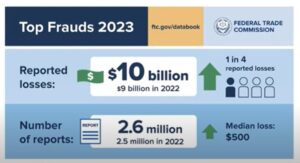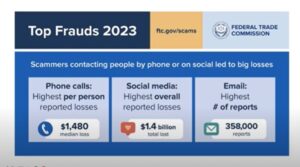
Scams in 2023 had a larger economic impact than the previous year, with consumers reporting losing more than $10 billion, a record figure that represented a 14 percent increase over 2022 reports.

The data recently published by the Federal Trade Commission (FTC) indicate that in 2023, consumers lost more money to investment scams reaching $4.6 billion, which represented an increase of 21 percent compared to 2022.
This was stated by experts during a briefing held by Ethnic Media Services, who stated that The imposter scam was the second most evident in 2023, with the second highest amount in losses, at almost 2.7 billion dollars, with bank transfers and the use of cryptocurrencies being the most used payment methods.
Maria Mayo, acting associate director of the Division of Consumer Response and Operations at the Federal Trade Commission's Bureau of Consumer Protection, said that reports of losses have increased this year, and she thought that the more information was provided and work was done on prevention this year, the more losses could decrease, something that did not happen.
“The most surprising thing was the amount that was lost, because I thought that last year it was very high, 9 million, but this year it rose to 10 million, it surprises me even though the number of complaints did not change that much during 2023.“, commented Maria Mayo.
The most relevant categories during 2023 were the following:
Impostors
It refers to a person who pretends to be another person from a company or institution, it is also related to false romantic partners, sometimes they use family members or friends to create complicated situations where they ask for financial help.
Online shopping
The most common scams related to online shopping are through fake websites with purchases of fictitious products, or on sites where they can access private information, as they carry out identity theft and clone cards or steal banking information.
Prizes and raffles
These types of scams make you believe that you have won some wonderful prize or some incredible promotion, but before you can collect it you must pay taxes or share your bank details. They generally put pressure on the supposed winner by making them believe that it is for a limited time and they must do what is asked immediately.
Investments
In these cases, the most common thing is that a person invites you to invest in cryptocurrencies or digital investments, in such a way that when you deposit your money it seems real, but they warn you of the risk of loss, where at some point the money disappears, the promise is to earn a lot with little and in a short period of time.
Business and job opportunities
In this case, you are asked to join a company with a small investment that could be recovered and earn much more by generating sales. Generally, the promise is to generate a lot with a minimum amount of investment. A strict schedule is not required, so it is a good offer for some people who need a free schedule. In the end, you do not generate any money, but you do invest.
Social Networking
Contact through social networks has increased, and since it is something that is used daily, people have become very vulnerable. It must also be considered that people who use social networks are of different ages, allowing for a broader reach within the community. In some cases, scams are directed at very specific sectors of the population, such as Latinos, Chinese, African-Americans, etc.
The most commonly used payment method in this type of scam is bank transfer, recording a loss of 1.9 billion dollars. On the other hand, cryptocurrencies have also been used, leaving a loss of 1.4 billion dollars during 2023.
Report and prevent fraud
It is important to fight fraud, you can educate to prevent and warn, thus reducing the number of money losses; now, regardless of the language, there are options to make reports in different languages, in this way more complete reports are generated to prevent the community.
To help people identify fraud, information is provided in 12 different languages, and to report it, you must enter the site https://reportefraude.ftc.gov/#/
There are also simple resources available to help you find out what to do if you have paid a scammer, tips on protecting small businesses, and useful information for refugees and migrants.
Experts stressed that the FTC continues to work and seek more options to protect consumers from the different scams that are currently being generated. Prevention and information are key to achieving a 2024 with fewer economic losses due to scams.

You may be interested in: Local journalism faces crisis in the face of new digital media

